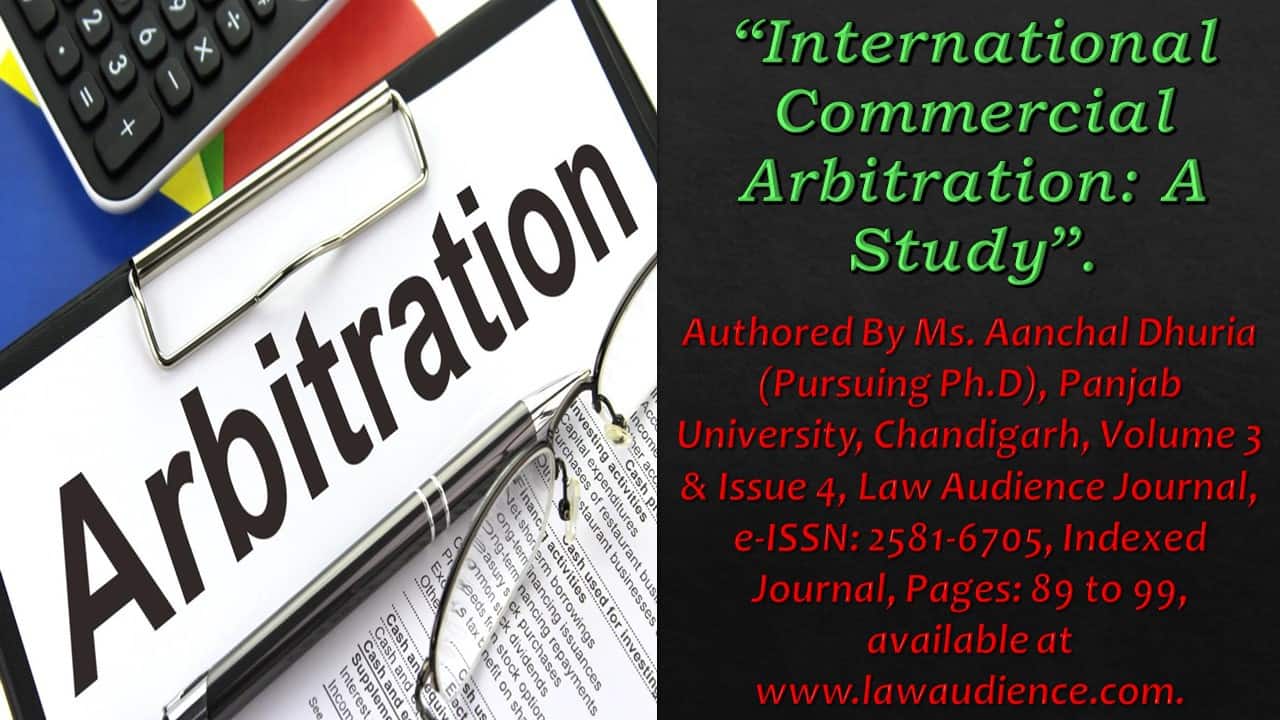Click here to download the full paper (PDF)
Authored By: Ms. Aanchal Dhuria (Pursuing Ph.D), Panjab University, Chandigarh,
Click here for Copyright Policy.
I. INTRODUCTION:
“Increase in international trade and investment is accompanied by growth in cross-border commercial disputes. Given the need for an efficient dispute resolution mechanism, international arbitration has emerged as the preferred option for resolving cross-border commercial disputes and preserving business relationships. With an influx of foreign investments, overseas commercial transactions, and open-ended economic policies acting as a catalyst, international commercial disputes involving India are steadily rising. This has drawn tremendous focus from the international community on India’s international arbitration regime”.
II. INTERNATIONAL COMMERCIAL ARBITRATION – MEANING:
Section 2(1)(f) of the Act defines an ICA as a legal relationship which must be considered commercial[1], where either of the parties is a foreign national or resident, or is a foreign body corporate or is an association or body of individuals whose central management or control is in foreign hands or a foreign government. Thus, under Indian law, an arbitration with a seat in India, but involving a foreign party will also be regarded as an ICA, and will be subject to Part I of the Act. However, where an ICA is held outside India, Part I of the Act would have no applicability on the parties (save the stand-alone provisions introduced by the Amendment Act, unless excluded by the parties, as discussed later) but the parties would be subject to Part II of the Act.
Notably, the scope of Section 2 (1) (f) (iii) was determined by the Supreme Court in the case of TDM Infrastructure Pvt. Ltd. v. UE Development India Pvt. Ltd.,[2] wherein, despite TDM Infrastructure Pvt. Ltd. having foreign control, it was concluded that “a company incorporated in India can only have Indian nationality for the purpose of the Act”. Thus, though the Act recognizes companies controlled by foreign hands as a foreign body corporate, the Supreme Court has excluded its application to companies registered in India and having Indian nationality. Hence, in case a corporation has dual nationality, one based on foreign control and other based on registration in India, for the purpose of the Act, such corporation would not be regarded as a foreign corporation.
III. INTERNATIONAL COMMERCIAL ARBITRATION WITH SEAT IN INDIA:
The laws applicable to ICA when seat of arbitration is in India have been discussed below;
III.I NOTICE OF ARBITRATION:
It is the first step in any arbitration proceeding. One party sends notice to the other party, asking for the settlement of the dispute through arbitration. Therefore, it implies the requirement of the following elements:
- There should be an intention of the party submitting the notice to refer the matter to arbitration.
- The party notifying should ask the other party to settle the dispute through arbitration.
Under Section 21 of the Act, except where the parties have agreed to the contrary, the date of commencement of the arbitration proceedings would be the date on which the recipient of the notice receives from the Claimant, a request for referring the disputes to arbitration.
III.II REFERRAL TO ARBITRATION:
Under Part I, the courts can refer the parties to arbitration if the subject matter of the dispute is governed by the arbitration agreement. Section 8 of the Act provides that if an action is brought before a judicial authority, which is the subject matter of an arbitration agreement, upon an application by a party, the judicial authority is bound to refer the dispute to arbitration. It is important to note that the above application must be made by the party either before or at the time of making his first statement on the substance of the dispute, and be accompanied by a duly certified or original copy of the arbitration agreement, and such an agreement need not be signed[3] nor stamped[4] for it to be considered valid.
III.III INTERIM RELIEFS:
Under the Act, the parties can seek interim relief from courts and arbitral tribunals under Sections 9 and 17 respectively. A party may, before, or during arbitral proceedings or at any time after the making of the arbitral award but before it is enforced, apply to a court for seeking interim measures and protections, including interim injunctions, under Section 9 of the Act. The Arbitral Tribunal, in accordance with Section 17, can also provide interim measures of protection or ask a party to provide appropriate security in connection with the matter of the dispute, as is found appropriate, during the course of the arbitral proceedings. However, the powers of the Arbitral Tribunal were narrow, as compared to the powers of the court under Section 9 of the Act.
III.IV APPOINTMENT OF ARBITRATORS:
Section 11 of the act provides for the appointment of arbitrators. The arbitrator can be of any nationality unless otherwise agreed by the parties. The parties have to appoint one arbitrator each and both the arbitrators have to further appoint a third arbitrator, within thirty days, since the arbitrators are required to be an odd number. However, if there are even number of arbitrators, for example there are two arbitrators and both the arbitrators give the same decision, then, in that case, there is no boundation of having a third arbitrator. If one of the parties or if the two appointed arbitrators do not appoint the third arbitrator within 30 days, the party can request the Supreme Court or relevant High Court (as applicable) to appoint an arbitrator.[5] The Supreme Court/High Court can authorize any person or institution to appoint an arbitrator.[6] In case of an ICA, the application for appointment of arbitrator has to be made to the Supreme Court and in case of a domestic arbitration, the respective High Courts having territorial jurisdiction will appoint the Arbitrator. The Amendment Act also empowers the Supreme Court in an India-seated ICA and the High Courts in domestic arbitration to examine the existence of an arbitration agreement at the time of making such appointment.[7]
III.V CHALLENGE TO APPOINTMENT OF ARBITRATOR:
Independence and impartiality of an arbitrator are the hallmarks of any arbitration proceedings. If there are circumstances due to which his independence and impartiality can be challenged, he/she must disclose the circumstances before his/her appointment.[8]
Appointment of an arbitrator can be challenged only if –
- Circumstances exist that give rise to justifiable doubts as to his/her independence or impartiality; or
- He/she does not possess the qualifications agreed upon by the parties.[9]
III.VI CHALLENGE TO JURISDICTION:
Under Section 16 of the Act, an Arbitral Tribunal has the competence to rule on its own jurisdiction, which includes ruling on any objections with respect to the existence or validity of the arbitration agreement. The doctrine of ‘competence-competence’ confers jurisdiction on the Arbitrators to decide challenges to the arbitration clause itself. In S.B.P. and Co. vs. Patel Engineering Ltd. and Anr.,[10] the Supreme Court has held that where the Arbitral Tribunal was constituted by the parties without judicial intervention, the Arbitral Tribunal could determine all jurisdictional issues by exercising its powers of competence- competence under Section 16 of the Act.
III.VII CONDUCT OF ARBITRAL PROCEEDINGS:
A. Flexibility in Respect of Procedure, Place and Language:
The Arbitral Tribunal should treat the parties equally and each party should be given full opportunity to present its case.[11] The Arbitral Tribunal is not bound by the CPC or the Indian Evidence Act, 1872.[12] The parties to arbitration are free to agree on the procedure to be followed by the Arbitral Tribunal. If the parties do not agree to the procedure, the procedure will be as determined by the Arbitral Tribunal. The Arbitral Tribunal has complete powers to decide the procedure to be followed, unless parties have otherwise agreed upon the procedure to be followed.[13] The Arbitral Tribunal also has powers to determine the admissibility, relevance, materiality and weight of any evidence.[14] Place of arbitration will be decided by mutual agreement. However, if the parties do not agree to the place, the same will be decided by the tribunal.[15] Similarly, the language to be used in arbitral proceedings can be mutually agreed. Otherwise, the Arbitral Tribunal can decide on the same.[16]
B. Submission of Statement of Claim and Defense:
The Claimant should submit the statement of claims, points of issue and the relief or remedy sought. The Respondent should state his defense in respect of these particulars. All relevant documents must be submitted. Such claim or defense can be amended or supplemented at any time.[17] For an application for counterclaim/set-off to be adjudicated upon in the same arbitration proceeding without requiring a fresh one.[18] The Arbitral Tribunal, under the amended Section 25 of the Act, can also exercise its discretion in treating the right of defendant to file the statement of defence as forfeited under specified circumstances.[19]
III.VIII HEARINGS AND WRITTEN PROCEEDINGS:
After submission of pleadings, unless the parties agree otherwise, the Arbitral Tribunal can decide whether there will be an oral hearing or whether proceedings can be conducted on the basis of documents and other materials. However, if one of the parties65 requests the Arbitral Tribunal for a hearing, sufficient advance notice of hearing should be given to both the parties. Thus, unless one party requests, oral hearing is not mandatory. The time limit for conduct of the arbitral proceedings have been streamlined and arbitrators are mandated to complete the entire arbitration proceedings within a span of 12 months from the date the Arbitral Tribunal enters upon the reference. However, a 6 months extension may be granted to the arbitrator by mutual consent of the parties. Beyond 6 months, any further extension may be granted to the arbitrator at the discretion of the court68 or else the proceedings shall stand terminated. An application for extension of time towards completion of arbitral proceedings has to be disposed of expeditiously. There is also a provision made for awarding additional fees, as consented upon by the parties, to them for passing the award within the time span of 6 months.[20]
III.IX SETTLEMENT DURING ARBITRATION:
It is permissible for parties to arrive at a mutual settlement even when the arbitration proceedings are going on. In fact, even the tribunal can make efforts to encourage mutual settlement. If parties settle the dispute by mutual agreement, the arbitration shall be terminated. However, if both parties and the Arbitral Tribunal agree, the settlement can be recorded in the form of an arbitral award on agreed terms, which is called a consent award. Such an arbitral award shall have the same force as any other arbitral award.[21]
III.X COST OF THE ARBITRATION:
The arbitral tribunal decides the cost of the arbitration and that how much amount each party has to pay. If a party refuses or fails to pay the legal and administration fees, then the tribunal in such a case refuse to give the award. After refusing to pay, the parties can approach the court and the court can further give its decision on the cost.
III.XI APPLICATION FOR SETTING ASIDE ARBITRAL AWARD:
If a party is not satisfied with the decision of the tribunal, then it can make an application to the court under section 34 of the act to set aside the arbitral award. For example, if the party making the application was not given proper notice of the appointment of the arbitrator, or if a party was under some incapacity, or if the arbitration agreement is not valid, or if the arbitral award is not related to the dispute, or is against the terms of submission to arbitration, or the matters that are not appropriate to submit to the arbitration. As per section 34 (2-A), an arbitral award arising out of arbitrations other than international commercial arbitration may also be set aside, if the award made is patently illegal in nature. The application to set aside the award has to be made within three months from the date of receiving of the award, unless there is a sufficient reason due to which the party could not apply within the required time. In such a case the court can entertain the application to set aside the arbitral award within a further period of thirty days.
III.XII APPEALS:
An appeal lies from the following orders, and from no others, to the court authorized by law to hear appeals from original decrees of the court passing the order:[22]
- granting or refusing to grant any measure under Section 9;
- setting aside or refusing to set aside an Arbitral Award under Section 34.
III.XIII ENFORCEMENT AND EXECUTION OF THE AWARD:
According to Section 35 of the Act, an arbitral award shall be final and binding on the parties and persons claiming under them. Thus, an arbitral award becomes immediately enforceable unless challenged under Section 34 of the Act. An ex parte award passed by an Arbitral Tribunal under Section 28 of the Act is also enforceable under Section 36. Even a settlement reached by the parties under Section 30 of the Act can be enforced under Section 36 of the Act as if it were a decree of the court.
IV. INTERNATIONAL COMMERCIAL ARBITRATION WITH SEAT IN A RECIPROCATING COUNTRY:
Post the decision of the Supreme Court in BALCO,[23] the Indian arbitration law has been made seat-centric. The Amendment Act clarifies that Part I of the Act will not be applicable to foreign seated arbitrations, save and except the standalone provisions discussed below in the table.
| Pre-BALCO (Bhatia Regime) | Post-BALCO | Amendment Act |
| Unless impliedly or expressly excluded by the parties, Part I of the Act will apply even to a foreign seated arbitration | Part I of the Act will not apply in case of foreign seated arbitration. The decision was given prospective effect and therefore applied to only arbitration agreements executed on or after September 6, 2012. If the arbitration agreement was executed prior to September 6, 2012, necessary modifications would have to be made in the arbitration agreement in order to be governed by the ruling in BALCO.[24] | Part I of the Act will not apply in case of foreign seated arbitration except Sections 9, 27 and 37 unless a contrary intention appears in the arbitration agreement. The Amendment Act is applicable prospectively with effect from October 23, 2015 (i.e. the commencement of the arbitral proceedings, or the court proceeding should be on or after October 23, 2015).[25] |
Part II of the Act is applicable to all foreign awards sought to be enforced in India and to refer parties to arbitration when the arbitration has a seat outside India. Part II is divided into two chapters, Chapter 1 being the most relevant one as it deals with foreign awards delivered by the signatory territories to the New York Convention which have reciprocity with India, while Chapter 2 is more academic in nature as it deals with foreign awards delivered under the Geneva Convention.[26]
A foreign award is defined under Part II of the Act. Following are the conditions:
- the award passed should be an arbitral award,
- it should be arising out of differences between the parties;
- the difference should be arising out of a legal relationship;
- the legal relationship should be considered as commercial;
- it should be in pursuance of a written agreement to which the New York Convention applies; and,
- there has to be further notification by the Central Government declaring that country to be a territory to which the New York Convention applies.
IV.I REFERRING PARTIES TO ARBITRATION UNDER PART II:
A judicial authority under Section 45 of the Act has been authorized to refer those parties to arbitration, who, under Section 44 of the Act have entered into an arbitration agreement. Section 45 of the Act starts with a non obstante clause, giving an overriding effect to the provision and making it prevail over anything contrary contained in Part I of the Act or the CPC. It gives the power to the Indian judicial authorities to specifically enforce the arbitration agreement between the parties. The court has to be satisfied that the agreement is valid, operative and capable of being performed.[27]
In Chloro Controls (I) P. Ltd. vs. Severn Trent Water Purification Inc. & Ors.[28] (“Chloro Controls”), the Supreme Court has held that the expression ‘person claiming through or under’, as provided under Section 45 of the Act, would mean and include within its ambit multiple and multiparty agreements. Hence, even non-signatory parties to some of the agreements can pray and be referred to arbitration. This ruling has widespread implications for foreign investors and parties as now, in certain exceptional cases involving composite transactions and interlinked agreements, even non-parties such as a parent company, subsidiary, group companies or directors can be referred to and made parties to an ICA.
IV.II ENFORCEMENT AND EXECUTION OF FOREIGN AWARDS:
When a party is seeking enforcement of a New York Convention award under the provisions of the Act, he/she must make an application to the Court of competent jurisdiction with the following documents
- The original/duly authenticated copy of the award;
- The original/duly authenticated copy of the agreement; and
- Such evidence as may be necessary to prove that the award is a foreign award.
There are several requirements for a foreign arbitral award to be enforceable under the Act –
- Commercial transaction- The award must be given in a convention country to resolve commercial disputes arising out of a legal relationship. In the case of RM Investment & Trading vs. Boeing,[29] the Supreme Court observed that the term “commercial” should be liberally construed as having regard to manifold activities which are an integral part of international trade.
- Written agreement- foreign arbitral agreement must be made in writing, although it does not have to be worded formally or be in accordance with a particular format.
- Agreement must be valid- The foreign award must be valid and arise from an enforceable commercial agreement.
Under Section 48 of the Act, in case of a New York Convention award, an Indian court can refuse to enforce a foreign arbitral award if it falls within the scope of the statutory defenses.[30]
IV.III APPEALABLE ORDERS:
Under Section 50 of the Act, an appeal can be filed by a party against the orders passed under Section 45 and Section 48 of the Act. However, no second appeal can be filed against the order passed under this Section. These orders are only appealable under Article 136 of the Constitution of India, 1950, and such an appeal is filed before the Supreme Court.
V. CONCLUSION:
A fast-growing economy requires a reliable stable dispute resolution process in order to be able to attract foreign investment. With the extreme backlog before Indian courts, commercial players in India and abroad have developed a strong preference to resolve disputes via arbitration. Despite India being one of the original signatories to the New York Convention, arbitration in India has not always kept up with the international best practices.
However, the last five years have seen a significant positive change in approach. Courts and legislators have acted with a view to bringing Indian arbitration law in line with the international best practices. With the pro-arbitration approach of the courts and the Amendment Act in place, there is cause to look forward to these best practices being adopted in the Indian arbitration law in the near future.
Exciting times are ahead for the Indian arbitration jurisprudence and our courts are ready to take on several matters dealing with the interpretation of the Amendment Act.
Cite this article as:
Ms. Aanchal Dhuria, “International Commercial Arbitration: A Study”, Vol.3 & Issue 4, Law Audience Journal (e-ISSN: 2581-6705), Pages 89 to 99 (7th March 2022), available at https://www.lawaudience.com/international-commercial-arbitration-a-study/.
Footnotes & References:
[1] ‘Commercial’ should be construed broadly having regard to the manifold activities which are an integral part of international trade today (R.M. Investments & Trading Co. Pvt. Ltd. v. Boeing Co., AIR 1994 SC 1136).
[2] 2008 (14) SCC 271
[3] M/s. Caravel Shipping Services Pvt. Ltd. v. M/s. Premier Sea Foods Exim Pvt. Ltd., 2018 SCC OnLine SC 2417.
[4] Coastal Marine Construction v. Garware Wall Ropes Limited, 2018 SCC OnLine Bom 541.
[5] Section 11(6) of the Act.
[6] Section 11(6)(b) of the Act.
[7] Section 11(6)(a) of the Act.
[8] Section 12(1) of the Act.
[9] Section 12(3)(b) of the Act
[10] 2005 (8) SCC 618
[11] Section 18 of the Act.
[12] Section 19(1) of the Act.
[13] Section 19(3) of the Act.
[14] Section 19(4) of the Act.
[15] Section 20 of the Act.
[16] Section 22 of the Act.
[17] Section 23 of the Act.
[18] Section 23(2A) of the Act.
[19] Section 25(b) of the Act.
[20] Section 29 of the Act.
[21] Section 30 of the Act.
[22] Section 37 of the Act.
[23] Bharat Aluminum Co. v. Kaiser Aluminum Technical Service, Inc., 2012 (9) SCC 552.
[24] Harmony Innovation Shipping Ltd v. Gupta Coal India Ltd.& Anr, (2015) 9 SCC 172
[25] Board of Control for Cricket in India v. Kochi Cricket Pvt. Ltd., (2018) 6 SCC 287
[26] As mostly all parties signatory to the Geneva Convention are now members of the New York Convention, Chapter 2 of Part II remains primarily academic.
[27] Power of judicial authority to refer parties to arbitration.—Notwithstanding anything contained in Part I or in the Code of Civil Procedure, 1908 (5 of 1908), a judicial authority, when seized of an action in a matter in respect of which the parties have made an agreement referred to in section 44, shall, at the request of one of the parties or any person claiming through or under him, refer the parties to arbitration, unless it finds that the said agreement is null and void, inoperative or incapable of being performed.
[28] 2013 (1) SCC 641
[29] AIR 1994 SC 1136.
[30] Following are the Statutory defenses:
- the parties to the agreement are under some incapacity;
- the agreement is void;
- the award contains decisions on matters beyond the scope of the arbitration agreement;
- the composition of the arbitral authority or the arbitral procedure was not in accordance with the arbitration agreement;
- the award has been set aside or suspended by a competent authority of the country in which it was made;
- the subject matter of dispute cannot be settled by arbitration under Indian law; or
- the enforcement of the award would be contrary to Indian public policy i.e. enforcement would be contrary to – i. fundamental policy of India; or ii. the interest of India; or iii. justice or morality.





